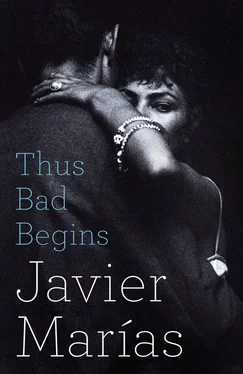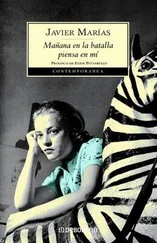This was not the case with Eduardo Muriel and Beatriz Noguera, his was not, to put it in pedantic terms, a quotidian or perfunctory aggression. There was on his part a deep-seated antagonism, vital and pulsating and far from ordinary, and a kind of strangely inconstant desire to inflict frequent punishments. It was as if he had to force himself to remember (once the right ice-cold button had been pressed) that he must behave towards her with a complete lack of consideration, with revulsion and scorn, to make it clear to her what a curse and a burden it was to endure her presence; to mistreat and even abuse her, and certainly to undermine her and make her feel insecure and even hopeless about her personality, her work, her body, and he was doubtless successful; after all, anyone can do that, even the most stupid of us, it’s the easiest thing in the world to destroy and wound, you don’t have to be especially wily or astute, still less intelligent, a fool can easily crush someone cleverer, and Muriel was a clever man. You just have to be ill-natured, ill-intentioned, ill-disposed, qualities to be found in abundance among the brutish and the dim. I sometimes had the feeling that, at some point in his married life, Muriel had decided to embark on a revenge that would never end, never be sated, and I wondered about his possible motives, what unforgivable offence Beatriz Noguera might have committed. Not that I was convinced she had. I was already aware that the cruellest of individuals depend a great deal on the puzzlement of others, trusting that their assaults will seem so disproportionate that other people, rather than judging the assailant severely and trying to placate him or get him to stop, will merely shrug and wonder what terrible crime the object of his cruelty could have committed, and conclude, even though they have no idea if they’re right or wrong, that ‘it must have been something really bad, otherwise how explain such venom; whatever it is must justify such extreme behaviour’. And the cruel beast does his best to ensure that no one uncovers the truth, that nothing leaks out about that ‘whatever it is’, the mysterious alibi, which, up to a point, protects the perpetrator and, odd though it may seem, even saves him.
So I was greatly alarmed by what I saw and heard, because it made me think that, when no witnesses were around, his irritation would only increase, his wounding words would become still more cutting, and he might even use foul language, which he rarely did in my presence or even when we were with his friends. I trusted that it never went beyond words, that he never raised his hand to her (I was less alarmed by the thought that she might slap his face, for she had more than enough reason to), and I didn’t believe he would ever do that. My belief, however, was also my wish, which meant that my belief was necessarily a qualified one, and this did not entirely reassure me. At first, I didn’t dare ask Muriel what lay behind the sharp, sullen, scornful way in which he treated his wife, he had already warned me once that he wasn’t paying me to ask questions about matters that were none of my business, and on that occasion I’d been asking him about something far less delicate than his wretchedly unhappy relationship with his wife, namely, the silencing of his now silent eye. And in those early days, I rarely or almost never saw Beatriz on her own; she viewed me from afar as a mere appendage of her husband, which I suppose I was. And yet, doubtless because of my youth, she looked on me kindly. Besides, I was always solicitous and attentive, which is how I was brought up to treat all women (initially), and I was in no way infected — as would have been equally inappropriate — by my boss’s rough ways. On the contrary, I tried to oppose them, insofar as I could, without stepping out of line or butting in where I wasn’t wanted. I mean that I would always, without fail, stand up whenever Beatriz entered the room, although Muriel never followed my example, but then, between a married couple, that might have been a touch excessive; I would greet her with a slight nod, as if we were still living in the nineteenth century, and with a broad, spontaneous smile, making it clear by my amiable attitude that, should she ever need me, I would always be glad to help. She was, after all, the wife of my employer, a man whom I admired. As such, she deserved my utmost respect and all I could do was to demonstrate this to her, regardless of what great rifts lay between them. And Muriel would doubtless have ticked me off had he noticed the slightest negligence in my treatment of his wife. I should add that there were also times when he spoke or listened to her with deference, interest and even affection. As I said, I found it very easy to be nice to her. In fact, I liked Beatriz Noguera right from the start.
I didn’t like her any less than I did her husband, which says a lot; her life, albeit in a different way, was also being ground down by the weak wheel of the world, and I imagined that the indifferent sentinel observing all our lives would be more than usually bored by hers. But who knows, that same moon, just as we writers do (even if we only write private memoirs or diaries or letters, not intending them to be read by anyone or perhaps by just one person), may occasionally take a long hard look at those who will never go beyond their own bounds, those who one knows early on will leave no trace or track and will barely be remembered once they disappear (they will be like falling snow that does not settle, like a lizard climbing up a sunny wall in summer, like the words, all those years ago, that a teacher painstakingly wrote on the blackboard only to erase them herself at the end of the class, or leave them to be erased by the next teacher to occupy the room) and about whom not even their nearest and dearest will have any anecdotes to recount. That sentinel has doubtless grown weary of watching with half an eye the battles and travails of those whose foolish fate and future it can already foresee, weary of hearing their shouts and embarrassed by their bragging, of being present at the usually avoidable tragedies most such creatures bring upon themselves, and to which, from time immemorial, it has sworn to be a silent witness, impartial and useless, as darkness falls and throughout the night. Yes, just to pass the time — to vary and escape the tedium imposed on it by the monotonous masses — it might notice those beings who seem to tiptoe through life and to be just passing through or on temporary loan even while they’re alive, knowing that some of them might well harbour stories that are far odder and more intriguing, clearer and more personal, than the stories of the shrill exhibitionists who fill most of the globe with their racket and exhaust it with their wild gesticulations.
For a time, I assumed that this night sentinel would pay closest attention to what Shakespeare called ‘a woeful bed’, like that of the young widowed princess, whose husband had been murdered in Tewkesbury, stabbed in a conveniently ‘angry mood’ by the person who had most to gain. Except that Muriel was still alive and, when he was in Madrid, he shared an apartment with Beatriz. They did not, however, share a bedroom, they each had their own, and I soon realized that she was banned from entering his room, its door kept firmly shut day and night, night after night and day after day.
It was after a week or more of intense work, involving the feverish preparation and translation of a hastily cobbled-together script to be presented to Harry Alan Towers (I was, by then, an English graduate), when Muriel decided that I should spend the night there so that I could work until late and start again, without delay, the following morning. It was the first time I’d stayed over in his spacious apartment (although there were other occasions later on), in a big house near the top of Calle Velázquez, with, from the balconies, a view to one side of the Parque del Retiro; an old house that had not yet been divided up into several smaller apartments, as has become the norm in Madrid and in other cities since the well-to-do or merely bourgeois families ceased to be quite so large and dispensed with any live-in servants; the Muriels still employed a maid, who had been the children’s nanny when they were small. The very long corridor was in the shape of a U, although it seemed more like a J if you stopped in the kitchen, where you felt it came to a complete halt, just where the curve of a J would end. The maid’s room was immediately before that, and she took efficient care of all the housekeeping, a stoical or possibly merely puzzled woman — or maybe these were simply the disguises adopted by her discretion — who had probably been of an indefinable age ever since she was in the first flower of youth (it was odd to think of her like that, even retrospectively and speculatively) and who bore the unlikely name of Flavia, as if she were a Roman. Anyway, a white door at the far end of the kitchen gave unexpected access to the rest of the apartment, and once you got past a tiny bedroom and a minuscule bathroom with a shower over one of those once fashionable hip baths (an idiotic, uncomfortable invention) and an area of apparently redundant space reached through a low, arched doorway, seemingly made for children or dwarves, you returned once more to the corridor and the remaining part of the U. And that chambre de bonne with barely enough space for a bed and a chair — it had probably belonged to the maid in bygone days, and the room Flavia now occupied would have been the cook’s room, for cooks traditionally had more authority — was where I stayed for those few nights, as though I were living in a diminutive, separate apartment, almost cut off from the rest of the house, given that the only access was through the kitchen. However, this wasn’t quite true because, as I said, if you went through that gnome-sized door, theoretically unusable — it had no external handle or knob, only an internal one, so while you could open it from the inside, from the corridor it appeared to be blocked, and there was no lighting in that forgotten area either — you then found yourself at the end of the U and, although you were some considerable distance from the apartment proper and from the main bedrooms, all or most of those rooms opened out on to that corridor.
Читать дальше












